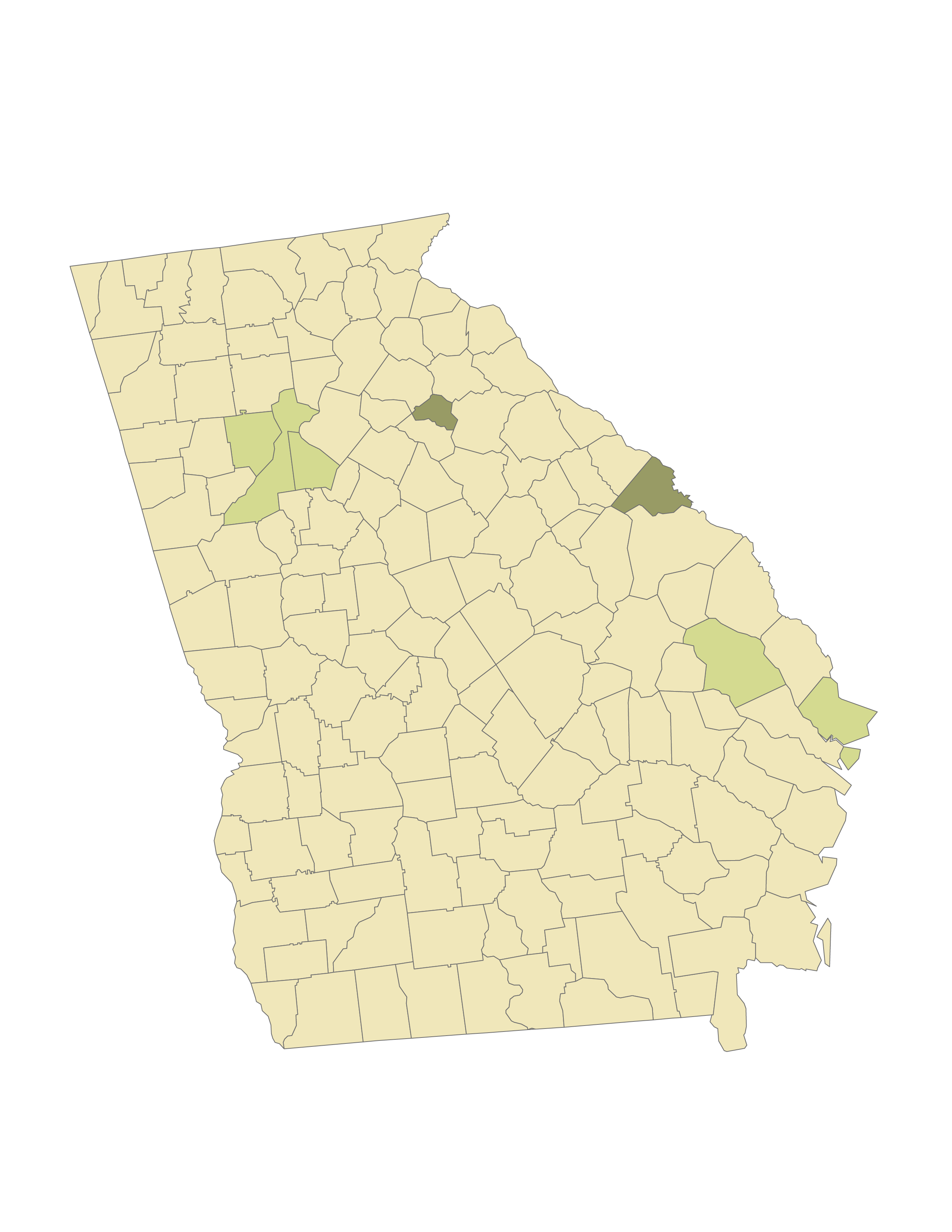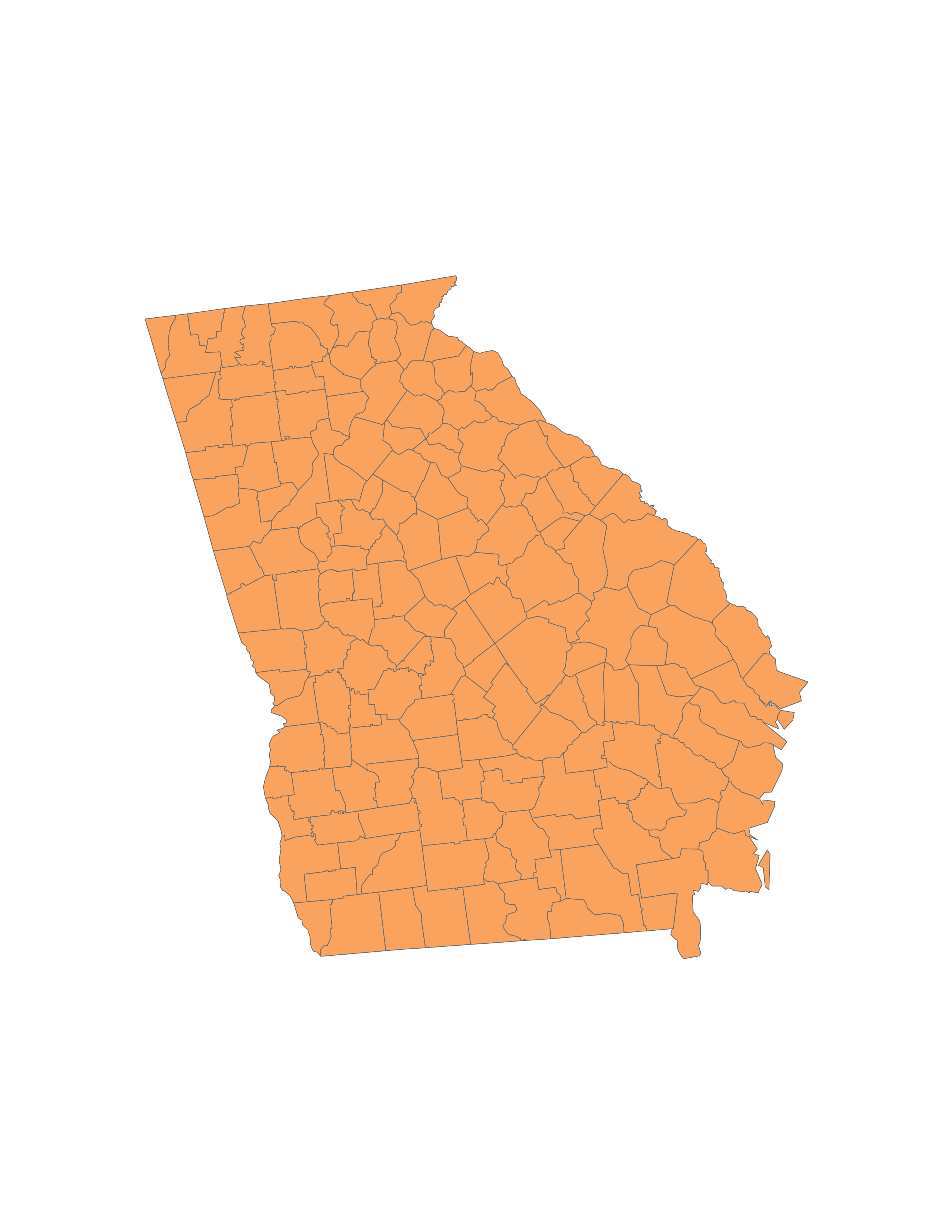
Georgia's Equality Profile
Quick Facts About Georgia
Georgia's LGBTQ Policy Tally

Georgia's LGBTQ Laws and Policies
Click on each issue for more information and to see where the state fits into the national landscape.
- State has this law Indicates state law or policy
- State has this law Indicates local laws or policies and/or partial law
- State does not have this law Indicates no law or policy
- Enumeration not applicable
| Relationship and Parental Recognition | Sexual Orientation | Gender Identity | ||
|---|---|---|---|---|
| Law Exists? | Tally | Law Exists? | Tally | |
|
As a result of the 2015 U.S. Supreme Court decision in Obergefell, same-sex couples can marry nationwide and states must extend all the rights and benefits of marriage to same-sex couples. As a result, the following benefits are available to all married same-sex couples on the same basis they are available to married different-sex couples: Marriage for Same-Sex Couples
Medical Decision-Making Authority for Married Same-Sex Couples
Stepparent Adoption for Married Same-Sex Couples
Joint Adoption for Married Same-Sex Couples
|
1/1 | |||
| Second-Parent Adoption for Unmarried Couples | 0/1 | |||
| Confirmatory Adoption | 0/1 | |||
| Voluntary Acknowledgement of Parentage (VAP) | 0/1 | |||
|
Family Services Nondiscrimination Laws
Adoption Nondiscrimination Protections for LGBTQ Parents Foster Care Nondiscrimination Protections for LGBTQ Parents |
0/0.5 0/0.5 |
0/0.5 0/0.5 |
||
| Recognition for Parents Using Assisted Reproduction | 0/1 | |||
|
State Family Leave Laws
LGBTQ-Inclusive Definitions of Spouse/Partner LGBTQ-Inclusive Definitions of Children/Parents |
0/0.5 0/0.5 |
|||
| Subtotal | 1/7 | 0/1 | ||
| Relationship and Parental Recognition Total | 1/8 | |||
| State Nondiscrimination Laws | Sexual Orientation | Gender Identity | ||
|---|---|---|---|---|
| Law Exists? | Tally | Law Exists? | Tally | |
| As a result of a June 2020 U.S. Supreme Court ruling, people in all states can seek recourse for employment discrimination based on sexual orientation and gender identity through the federal Equal Employment Opportunity Commission and federal courts. | ||||
| Employment Nondiscrimination Laws* | 0/1 | 0/1 | ||
| Housing Nondiscrimination Laws* | 0/1 | 0/1 | ||
| Public Accommodations Nondiscrimination Laws* | 0/1 | 0/1 | ||
| Credit and Lending Nondiscrimination Laws | 0/1 | 0/1 | ||
| Nondiscrimination Policies for State Employees | 0/0.5 | 0/0.5 | ||
| Negative Law: State Bans Cities and Counties from Passing Nondiscrimination Laws | No Negative Law | 0/-1 | No Negative Law | 0/-1 |
| Negative Law: State Bans Transgender People From Using Bathrooms or Facilities Consistent With Their Gender Identity In Government-Owned Buildings | No Negative Law | 0/-1 | ||
| Negative Law: State Explicitly Defines “Sex” Throughout State Law To Exclude Transgender People | No Negative Law | 0/-1 | ||
| Subtotal | 0/4.5 | 0/4.5 | ||
| Nondiscrimination Total | 0/9 | |||
| Religious Exemption Laws | Sexual Orientation | Gender Identity | ||
|---|---|---|---|---|
| Law Exists? | Tally | Law Exists? | Tally | |
| Negative Law: Broad "RFRA" or Religious Exemption Law | NEGATIVE LAW | -0.5/-0.5 | NEGATIVE LAW | -0.5/-0.5 |
| Negative Law: Targeted Religious Exemption for Child Welfare Services | No Negative Law | 0/-1 | No Negative Law | 0/-1 |
| Negative Law: Targeted Religious Exemption for Medical Professionals | No Negative Law | 0/-1 | No Negative Law | 0/-1 |
|
Negative Law: Targeted Wedding Services
Private Wedding Services State and Local Officials Providing Marriage Licenses |
No Negative Law
No Negative Law |
0/-0.5
0/-0.5 |
||
| Subtotal | -0.5/-3.5 | -0.5/-2.5 | ||
| Religious Exemption Laws Total | -1/-6 | |||
| Healthcare Laws and Policies | Sexual Orientation | Gender Identity | ||
|---|---|---|---|---|
| Law Exists? | Tally | Law Exists? | Tally | |
| Private Health Insurance Nondiscrimination Laws | 0/1 | 0/1 | ||
| Negative Law: Ban on Best Practice Medical Care for Transgender Youth | NEGATIVE LAW | -1/-1 | ||
| "Shield" Laws Protecting Access to Transgender Health Care | 0/1 | |||
| Health Insurance Providers Banned from Excluding Coverage for Transgender-Specific Care | 0/1 | |||
| State Medicaid Policy Related to Coverage for Transgender People | 1/1 | |||
| Transgender Inclusive Health Benefits for State Employees | 0.5/0.5 | |||
|
Data Collection
LGBTQ Adults LGBTQ Youth |
0.5/0.5 0/0.5 |
0.5/0.5 0/0.5 |
||
| Fertility Treatment Coverage in Private Insurance | 0/1 | 0/1 | ||
| Fertility Treatment Coverage in Medicaid | 0/0.5 | 0/0.5 | ||
| Fertility Preservation Coverage in Private Insurance | 0.25/1 | |||
| Fertility Preservation Coverage in Medicaid | 0/0.5 | |||
| Subtotal | 0.5/3.5 | 1.25/8.5 | ||
| Healthcare Total | 1.75/12 | |||
| Criminal Justice Laws and Policies | Sexual Orientation | Gender Identity | ||
|---|---|---|---|---|
| Law Exists? | Tally | Law Exists? | Tally | |
| Hate Crime Law Covering LGBTQ People | 1/1 | 1/1 | ||
| Ban on Panic Defense | 0/1 | 0/1 | ||
| Jury Service Nondiscrimination | 0/1 | 0/1 | ||
| Negative Law: HIV Criminalization Law | NEGATIVE LAW | -0.5/-1 | NEGATIVE LAW | -0.5/-1 |
| Negative Law: Restrictions on Drag Performances | No Negative Law | 0/-1 | No Negative Law | 0/-1 |
| Subtotal | 0.5/3 | 0.5/3 | ||
| Criminal Justice Total | 1/6 | |||
| Ability for Transgender People to Correct Name and Gender Marker on Identity Documents |
Sexual Orientation | Gender Identity | ||
|---|---|---|---|---|
| Law Exists? | Tally | Law Exists? | Tally | |
| Changing Gender Marker on Driver's Licenses | NEGATIVE LAW | -0.75/1 | ||
| Changing Gender Marker on Birth Certificates | NEGATIVE LAW | -0.75/1 | ||
|
Gender Neutral Options
"X" Option on Driver's Licenses "X" Option on Birth Certificates |
0/0.5 0/0.5 |
|||
| Name Change Process | NEGATIVE LAW | -1/1 | ||
| Subtotal | -2.5/4 | |||
| Identity Documents Total | -2.5/4 | |||
| Grand Totals | Sexual Orientation Policy Tally |
Gender Identity Policy Tally |
Overall Tally |
|---|---|---|---|
| Totals | 1.5/23 | -2.25/26 | -0.75/49 |
| Ratings | LOW | NEGATIVE | NEGATIVE |
Local Nondiscrimination Ordinances
Sexual Orientation

of population
fully protected
of population only
partially
protected
- State
Protections - County
Protections - City
Protections - No
Protections - Protections
Banned
Legend
County map only shows areas with full protections for sexual orientation (i.e., discrimination prohibited in private employment, housing, and public accommodations)
City and County Numbers:
2 counties out of 159 have an ordinance prohibiting discrimination based on sexual orientation in private employment, housing, and public accommodations (full protections).
13 cities have an ordinance prohibiting discrimination based on sexual orientation in private employment, housing, and public accommodations (full protections).
3 municipalities, not including those listed above, have an ordinance prohibiting discrimination based on sexual orientation in private employment, housing, or public accommodations (only partial protections). See table below.
12% of the state population is protected against discrimination based on sexual orientation in private employment, housing, and public accommodations (full protections).
An additional 11% of the state population is protected against discrimination based on sexual orientation in private employment, housing, or public accommodations (only partial protections).
Gender Identity

of population
fully protected
of population only
partially
protected
- State
Protections - County
Protections - City
Protections - No
Protections - Protections
Banned
Legend
County map only shows areas with full protections for gender identity (i.e., discrimination prohibited in private employment, housing, and public accommodations)
City and County Numbers:
2 counties out of 159 have an ordinance prohibiting discrimination based on gender identity in private employment, housing, and public accommodations (full protections).
13 cities have an ordinance prohibiting discrimination based on gender identity in private employment, housing, and public accommodations (full protections).
2 municipalities, not including those listed above, have an ordinance prohibiting discrimination based on gender identity in private employment, housing, or public accommodations (only partial protections). See table below.
12% of the state population is protected against discrimination based on gender identity in private employment, housing, and public accommodations (full protections).
An additional 11% of the state population is protected against discrimination based on gender identity in private employment, housing, or public accommodations (only partial protections).
City and County Listing:
| Fully inclusive SO/GI protections |
Local Sexual Orientation Protections | Local Gender Identity Protections | |||||||
|---|---|---|---|---|---|---|---|---|---|
| Employment | Housing | Public Accom. | Employment | Housing | Public Accom. | ||||
| Athens-Clarke County | |||||||||
| Augusta-Richmond County | |||||||||
| DeKalb County (unincorporated areas only) | |||||||||
| Gwinnett County (unincorporated areas only) | |||||||||
| Atlanta | |||||||||
| Brookhaven | |||||||||
| Chamblee | |||||||||
| Clarkston | |||||||||
| Decatur | |||||||||
| Doraville | |||||||||
| Dunwoody | |||||||||
| East Point | |||||||||
| Hapeville | |||||||||
| North High Shoals | |||||||||
| Savannah | |||||||||
| Smyrna | |||||||||
| Statesboro | |||||||||
| Tucker | |||||||||
- Local ordinance provides this protection |
|||||||||
NOTE: Only jurisdictions with ordinances that prohibit discrimination in private employment are listed. Other localities may have executive orders that apply to government employees and these are not listed. The level of enforcement of these ordinances may vary by jurisdiction. This information is constantly changing, and we welcome suggestions for additions or changes. For questions regarding ordinances or any other aspect of the state profile, please contact MAP at info@mapresearch.org.
This data was collected in collaboration with the Equality Federation and Georgia Equality and is maintained by MAP.
Local Conversion Therapy Ordinances
Conversion Therapy Bans

of population
protected
- State
Protections - County
Protections - City
Protections - No
Protections - Protections
Banned
